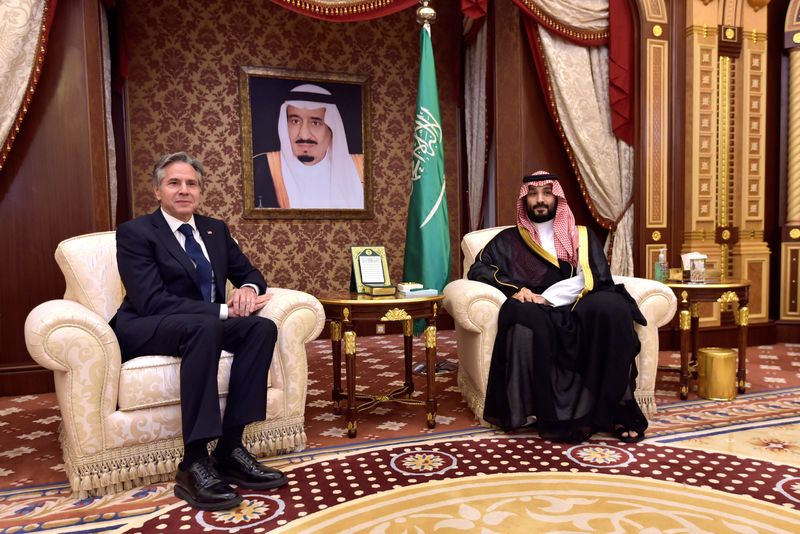By Humeyra Pamuk and Aziz El Yaakoubi
JEDDAH, Saudi Arabia (Reuters) -U.S. Secretary of State Antony Blinken had an "open, candid" conversation with Saudi Crown Prince Mohammed bin Salman in the early hours of Wednesday about a wide range of bilateral issues, a U.S. official said.
The top U.S. diplomat arrived in Saudi Arabia late on Tuesday for a much anticipated visit amid frayed ties due to deepening disagreements on everything from Iran policy to regional security issues, oil prices and human rights.
Washington has struggled to steady the relationship with Riyadh, where the de facto ruler Prince Mohammed has dominated the decision-making, and as the traditional oil-for-security alliance crumbled under the emergence of the United States as a major oil producer.
Blinken's visit came days after top crude exporter Saudi Arabia pledged to deepen oil output cuts on top of a broader OPEC+ deal to limit supply, as it seeks to boost flagging oil prices despite opposition from the U.S. administration.
Blinken and the crown prince, known as MbS, met for an hour and 40 minutes, a U.S. official said, covering topics including Israel, the conflict in Yemen, unrest in Sudan as well as human rights.
"There was a good degree of convergence on potential initiatives where we share the same interests, while also recognising where we have differences," the U.S. official said.
A good part of the discussion was expected to be dominated by the possible normalisation of ties between Saudi Arabia and Israel, even though officials had played down the likelihood of any immediate or major progress on the issue.
"They discussed the potential for normalization of relations with Israel and agreed to continued dialogue on the issue," the U.S. official said, without providing further details.
In a speech in Washington on Monday before departing for Jeddah, Blinken cautioned that any breakthrough on the issue would not be immediate. "We have no illusions that this can be done quickly or easily," he said.
Saudi Arabia, a Middle East powerhouse and home to Islam's two holiest shrines, gave its blessing to Gulf neighbours United Arab Emirates and Bahrain establishing relations with Israel in 2020 under the previous U.S. administration of Donald Trump.
Riyadh has not followed suit, saying Palestinian statehood goals should be addressed first. In April, Saudi Arabia restored ties with Iran, a regional rival and Israel's arch-foe.
NUCLEAR TECHNOLOGY
Developing a civilian nuclear programme is among Riyadh's conditions for normalising ties with Israel, a source familiar with the discussions said, confirming a New York Times report from March. Saudi or U.S. officials have not publicly confirmed that.
However, U.S. officials have said in the past they would share nuclear power technology only if the agreement prevents enrichment of uranium or reprocessing of plutonium made in reactors - two routes to making nuclear weapons.
Riyadh has also leveraged its growing relationship with China as Washington pushed back against some of its demands including lifting restrictions on arms sales and help with sensitive high-tech industries.
Two days after Blinken's visit, Riyadh will host a major Arab-Chinese investment conference.
Jonathan Fulton, non-resident senior fellow at Atlantic Council, said China would help the Saudis in sectors where the United States won't but the relationship between Riyadh and Beijing did not have the same depth as with Washington.
"At this point I'd still characterize the U.S.-Saudi relationship as strategic and the China-Saudi relationship as transactional," Fulton said.
In brief remarks before a meeting of Gulf Cooperation Council (GCC) foreign ministers, Blinken sought to reassure them of Washington's focus in the region.
"The United States is in this region to stay and we remain deeply invested in partnering with all of you," he said.
MbS and Blinken also discussed Yemen and potential ways to resolve remaining issues, while Blinken thanked the crown prince for the kingdom's role in pushing for a ceasefire in Sudan and helping evacuate U.S. citizens.
Blinken also raised human rights issues with MbS, the U.S. official said, both on a broad level and relating to specific cases, although did not say which cases.

The kingdom has been pouring hundreds of billions of dollars into transforming and opening its economy to reduce dependence on crude oil. The reforms have been accompanied by a raft of arrests of critics of MbS, as well as of businessmen, clerics and rights activists.
Most recently in March, Saudi authorities released a U.S. citizen jailed for 19 years for posting criticism of the government on Twitter but he has remained banned from travelling.